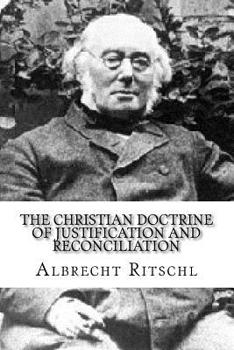The Christian Doctrine of Justification and Reconciliation
This is a reprint of the classic book by Albrecht Ritschl, "The Christian Doctrine of Justification and Reconciliation". Translated by Hugh Ross Mackintosh. Ritschl claimed to carry on the work of Luther and Schleiermacher, especially in ridding faith of the tyranny of scholastic philosophy. His system shows the influence of Kant's destructive criticism of the claims of Pure Reason, recognition of the value of morally conditioned knowledge, and doctrine of the kingdom of ends; of Schleiermacher's historical treatment of Christianity, regulative use of the idea of religious fellowship, emphasis on the importance of religious feeling; and of Lotze's theory of knowledge and treatment of personality. Ritschl's work made a profound impression on German thought and gave a new confidence to German theology, while at the same time it provoked a storm of hostile criticism. In spite of this resistance the Ritschlian "school" grew with remarkable rapidity, with followers dominating German theological faculties in the late nineteenth and early twentieth centuries. This is perhaps mainly due to the bold religious positivism with which he assumes that spiritual experience is real and that faith has not only a legitimate but even a paramount claim to provide the highest interpretation of the world. The life of trust in God is a fact, not so much to be explained as to explain everything else. Ritschl's standpoint is not that of the individual subject. The objective ground on which he bases his system is the religious experience of the Christian community. The "immediate object of theological knowledge is the faith of the community," and from this positive religious datum theology constructs a "total view of the world and human life." Thus the essence of Ritschl's work is systematic theology. Nor does he painfully work up to his master-category, for it is given in the knowledge of Jesus revealed to the community. That God is love and that the purpose of His love is the moral organization I of humanity in the "Kingdom of God" - this idea, with its immense range of application-is applied in Ritschl's initial datum. From this vantage-ground Ritschl criticizes the use of Aristotelianism and speculative philosophy in scholastic and Protestant theology. He holds that such philosophy is too shallow for theology. Hegelianism attempts to squeeze all life into the categories of logic: Aristotelianism deals with "things in general" and ignores the radical distinction between nature and spirit. Neither Hegelianism nor Aristotelianism is "vital" enough to sound the depths of religious life. Neither conceives God "as correlative to human trust" (cf. Theologie und Metaphysik). But Ritschl's recoil carries him so far that he is left alone with merely "practical" experience. "Faith" knows God in His active relation to the kingdom," but not at all as "self-existent". (From Wikipedia)
Format:Paperback
Language:English
ISBN:1975948653
ISBN13:9781975948658
Release Date:August 2017
Publisher:Createspace Independent Publishing Platform
Length:686 Pages
Weight:1.99 lbs.
Dimensions:1.4" x 6.0" x 9.0"
Customer Reviews
0 rating





